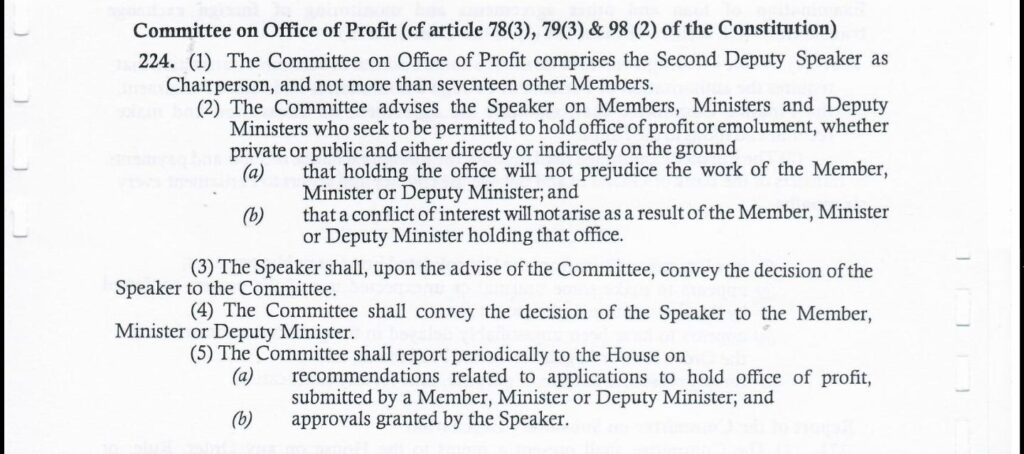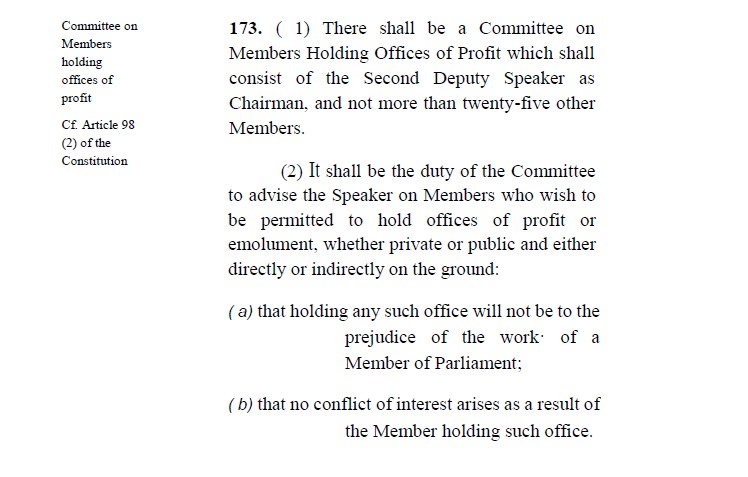Member of Parliament (MP) for Gomoa Central, Kwame Asare Obeng (alias A Plus), recently claimed that Members of Parliament are required to obtain a clearance from the Speaker before engaging in any business for profit, for as long as they are serving as lawmakers.
Speaking on the United Showbiz show, a weekend entertainment programme on UTV, on April 12, 2025, he said: “The kind of things I want to do in Gomoa today, I’m not able to get money to do them.
“And I haven’t got the approval to work. As a Parliamentarian, you need a certificate to do a different job… any type of job you do for profit, the Speaker must approve. And so if the Speaker hasn’t approved, you can’t make extra income.”
This explainer would explain the processes MPs must go through to get the Speaker’s clearance and what the 1992 Constitution and Parliament’s Standing Orders say about MPs engaging in office of profit.
The 1992 Constitution
Article 98 of the 1992 Constitution which deals with emoluments of Members of Parliament, prohibits MPs from holding any office of profit or emolument unless permitted to do so by the Speaker acting on the recommendations of a committee of Parliament on the following grounds;
(a) holding that office will not prejudice the work of a member of Parliament; and
(b) No conflict of interest arises or would arise as the member holding that office.
The committee that makes this recommendation is a Standing Committee known as the Committee on Office of Profit.
According to Parliament, the Committee on the Office of Profit, “advises the Speaker on whether Members, Ministers and Deputy Ministers can hold offices of profit or emoluments, considering if such positions won’t hinder their official duties or create conflicts of interest.
“The Speaker, after consulting the Committee, informs both the Committee and the individual of their decision,” according to a post on the website of the Parliament of Ghana.
Composition of the Committee:
The committee comprises:
- The Second Deputy Speaker as the Chairperson
- A Ranking Member as Vice Chairperson
- Deputy Ranking Member, and
- No more than 11 other members.
The Committee also occasionally reports to the House on recommendations and approvals related to holding an office of profit.
What the revised Standing Orders of Parliament say:
Standing Orders are the procedural rules governing the House of Parliament and its Committees. Until 2024 when Parliament adopted new House procedures, the old Standing Orders have been in effect since 2000.
According to the present Standing Orders (Order 224), the Committee on Office of Profit advises the Speaker on Members, Ministers, and Deputy Ministers who seek to be permitted to hold office of profit or emolument, whether private or public, and either directly or indirectly on the grounds that
- holding the office will not prejudice the work of the Member, Minister or Deputy Minister
- a conflict of interest will not arise as a result of the Member, Minister or Deputy Minister holding that office.
 Fig 1 – Screengrab from the 2024 Standing Orders of Parliament
Fig 1 – Screengrab from the 2024 Standing Orders of Parliament
The process as laid down in the Standing Orders indicates that the Speaker shall, upon the advice of the Committee, convey the decision of the Speaker to the Committee.
The Committee shall then convey the decision of the Speaker to the Member, Minister, or Deputy Minister.
It is noteworthy that a revision of the new Standing Orders allowed for Ministers of State to apply to hold office of profit. This was contained in the report of the committee that oversaw a revision of the Standing Orders.
“The Committee, however, observed that Standing Order 173 (2) enjoins only members of parliament seeking to hold office of profit to apply to the Committee on Members Holding Office of Profit. There is no express provision in the Standing Orders requiring Ministers of State to apply to hold an office of profit,” (find here).
In the old Standing Orders, paragraph (2) of Order 173 states, “It shall be the duty of the Committee to advise the Speaker on Members who wish to be permitted to hold offices of profit or emolument, whether private or public, and either directly or indirectly,” on two stated grounds.

Fig 2 – Screengrab from the 2020 Standing Orders of Parliament
The amendments to Order 173 in the new Standing Orders make provision for MPs occupying ministerial positions to apply to hold an office of profit based on recommendations from the Committee, which supervised the drafting of the new Standing Orders.
The Committee on Office for Profit has gone through an evolution from when it was known as the Committee on Members holding Offices of profit, but at all times it has been in tune with the spirit and letter of the Constitutional provision on which it is premised.
By: Gifty Danso



